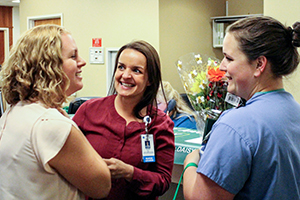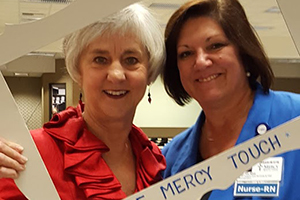SelfCare for HealthCare aims to improve employee engagement, staff retention and patient safety
By KATHLEEN NELSON
With two youngsters, staffing challenges and the constantly shifting regulations of health care, Heather Wall shares the struggle to find balance in her life with her nursing staff at PeaceHealth Sacred Heart Medical Center at RiverBend in Springfield, Ore.

From left, Dawn Holdt, Heather Wall and Joanna Long of PeaceHealth Sacred Heart Medical Center at RiverBend take part in an August 2018 presentation of a nursing award. Holdt was then program coordinator for nursing administration and is now senior quality facilitator; Wall is chief nursing officer; and Long is a nurse in the surgical unit.
"As a young mother, I'm trying to lead by example," said Wall, chief nursing officer at RiverBend. "I have 30 more years left in health care. I want to stay here and be the best I can be."
To help herself and her staff, Wall successfully advocated for implementing SelfCare for HealthCare, a yearlong program designed to restore balance in the lives of caregivers.
Founded by LeAnn Thieman, a nurse whose practice spanned three decades, the program has been used at 24 hospitals or health systems nationwide. It has shown promising results, including as a pilot program for the nursing staff at PeaceHealth RiverBend and at Mercy Medical Center in Cedar Rapids, Iowa, where it is offered to every employee.
"We really believe that everyone is a caregiver and believe in taking care of all staff," said Molly McWilliam, wellness coordinator at Mercy Cedar Rapids.
Taking care of the caregivers
The altruistic nature of a health care worker can be his or her undoing, especially when faced with long hours, staff reductions and ever-shifting regulations, policies and procedures.
"They sacrifice themselves to care for others," said Thieman, who has written or co-written 16 books, 13 of them in the "Chicken Soup for the Soul" series. "That's how we get derailed. Our loving hearts allow us to shortchange ourselves."
Health care workers, nurses in particular, empty the tank on the job, losing balance in their lives and their love for the calling. A survey of research published in 2015 by Marshall University of Huntington, W.Va., noted that burnout rates reported among nurses in those studies ranged from 30 to 70 percent.

LeAnn Thieman, founder of SelfCare for HealthCare, and Mary Brobst, chief nursing officer at Mercy Medical Center in Cedar Rapids, Iowa, celebrate the success of the program. Mercy Medical has enrolled about 1,000 of its 3,000 employees in SelfCare since the program's 2016 launch there.
Key features of SelfCare for HealthCare
- A two-day orientation led by LeAnn Thieman, creator of SelfCare for Healthcare. She meets with leadership and tours to meet staff and thank them for all they do.
- A study guide with 12 chapters, one for each month.
- A monthly video to introduce each chapter, which deals with such topics as relaxation, positive thinking, forgiveness, connecting with a higher power, time management and decision-making.
- A weekly Monday motivation email from Thieman. "I get more feedback on those than any other aspect of the program," said Molly McWilliam, wellness coordinator at Mercy Medical Center of Cedar Rapids, Iowa. "They're short, upbeat and end with an inspiring quote. People say they love it."
- A unit champion, who leads activities that all participants can engage in together monthly.
- A mobile app. Working with the American Nurses Association, Thieman secured continuing education credit of 26 contact hours for nurses who participate for an entire year and log the hours through the app. McWilliam said about 100 caregivers at Mercy use the app.
A study published in July of this year in the Journal of the American Geriatrics Society reported that 30 percent of registered nurses in long-term care facilities exhibited high levels of burnout, 31 percent were dissatisfied with their job and 72 percent reported missing one or more necessary care tasks on their last shift due to lack of time or resources.
Thieman added that the risk of burnout also is high among home health workers, "who work on islands, without the companionship and support of colleagues."
Burnout drives staff turnover. Thieman noted that the average hospital loses $5 million to $8 million a year due to RN turnover, making staff retention a high priority for cost containment.
"Caring for the caregiver is the best way to improve health care," Thieman said. Working with chief executives, chief nursing officers, human resources directors and experts on how adults learn, she developed a yearlong program with the goal of changing behaviors and cultures to improve employee satisfaction that would in turn improve patient safety and staff retention.
Wall, one of the CHA Tomorrow's Leaders class of 2019, was sold on the program because of its holistic, research-based approach. "When I saw the outcomes, it surpasses everything else," she said. Those outcomes, reported by Thieman from other hospitals in her program, include:
- 13 percent improvement in retention from one year to the next.
- 21 percent increase in work engagement.
- 16 percent decrease in sick days, saving thousands of dollars.
RiverBend committed to the program for two years, initially offering it in the spring to nurses, certified nursing assistants, recreational therapists and pharmacy staff.
"Over the past 10 years or so, there's been so much leadership turnover at the executive level. I wanted to give them something that was a stabilizing force," Wall said, adding that all RiverBend staff will be eligible to participate next year. If results are promising, the program will be offered throughout PeaceHealth, she said.
Since Mercy joined the program in 2016, more than 1,000 of its 3,000 staff members have participated. McWilliam reported that 63 percent of participants who responded to a survey midway through the program's third year agreed with the statement, "I am balancing my life mentally (e.g., breathing, relaxation, positive thinking, laughter, forgiveness)." This represents a 43 percent increase from the survey at the beginning of the first year. The respondents reported a 45 percent increase over the same time in balancing their spiritual life and a 38 percent decrease in considering leaving their positions.
"We can't 'unbreak' the system, but we also cannot give from an empty well," Thieman said. "When we are strong of mind, body and spirit, we can deliver the care our patients deserve and carry on our healing ministry of Jesus Christ."